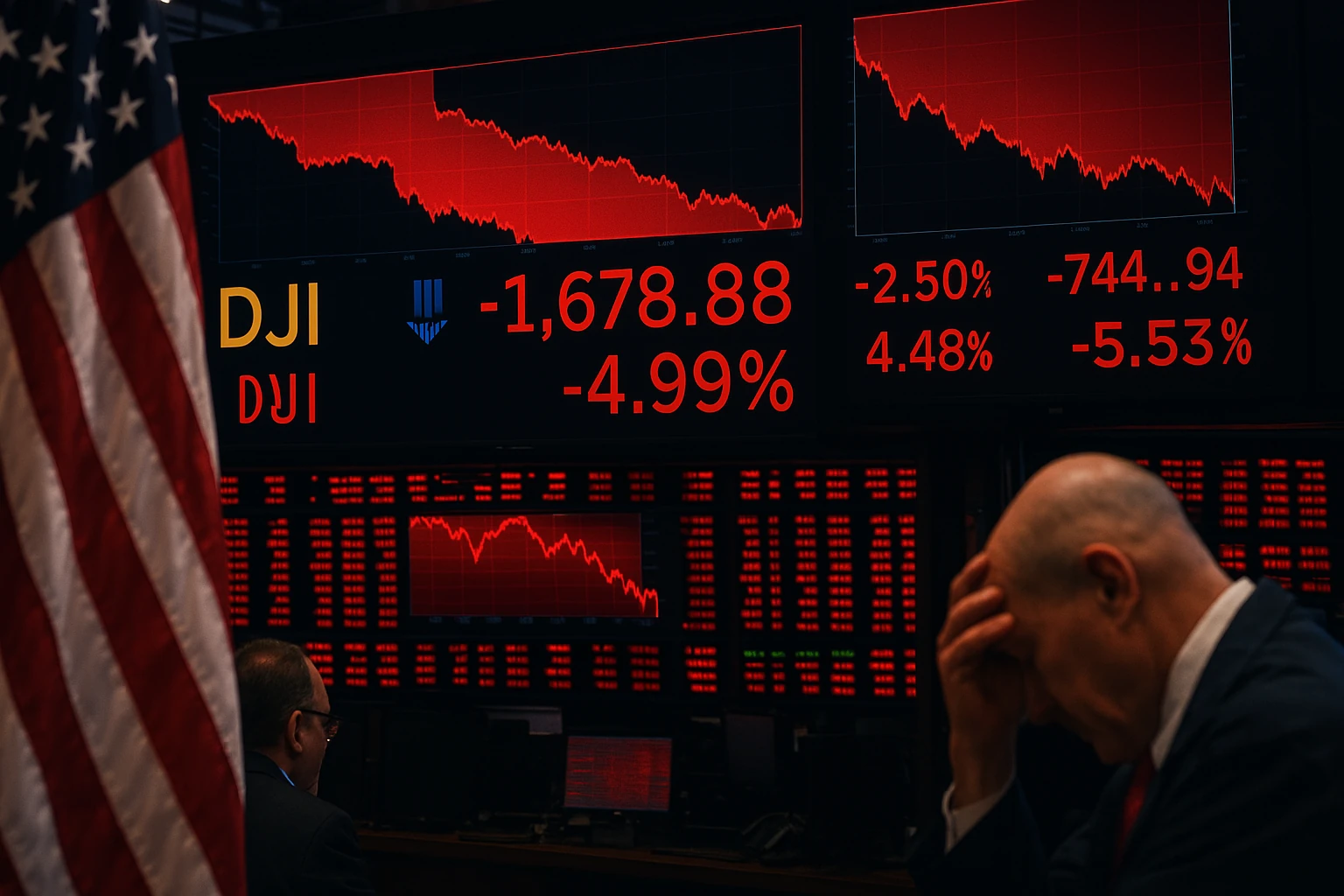The U.S. stock market crash in April 2025 has sent shockwaves through Wall Street and global financial markets. With the Dow Jones Industrial Average plunging nearly 1,700 points in a single day—the worst drop since 2020—investors are reeling from uncertainty. Triggered by sweeping new tariffs imposed by President Donald Trump, the sudden market selloff has wiped out over $3.1 trillion in value. In this article, we break down the causes of the 2025 stock market crash, how it’s impacting various sectors, what experts are saying about a potential recession, and what you should do to protect your investments moving forward. MarketWatch+3AP News+3New York Post+3
The Onset of the Stock Market Decline
On April 2, 2025, President Trump announced a comprehensive tariff plan, imposing a minimum 10% tariff on all imports, with certain countries and goods facing even higher rates. Notably, Chinese imports were subjected to a total tariff of 54% . This announcement, referred to by Trump as “Liberation Day,” was intended to address trade imbalances but instead triggered immediate and severe reactions in global financial markets. New York Post+1Wikipedia+1People.com+1Wikipedia+1
Immediate Market Reactions
The stock market’s response was swift and severe. On April 3, the Dow Jones Industrial Average plummeted 1,679 points, a 4% drop, marking one of its most significant single-day point losses. The S&P 500 fell by 4.84%, and the Nasdaq Composite dropped nearly 6%, officially entering bear market territory . This selloff erased approximately $3.1 trillion in market value, reflecting the depth of investor anxiety. WSJ+9Reuters+9Yahoo Finance+9New York Post+1New York Post+1
Global Market Impact
The repercussions extended beyond U.S. borders. European markets mirrored the downturn, with the FTSE 100 declining over 4%, Germany’s DAX dropping more than 4%, and France’s CAC falling similarly . Asian markets were also affected; Japan’s Nikkei fell nearly 9%, and Hong Kong’s Hang Seng experienced a steep 13% drop . These declines underscore the global nature of the market’s apprehension regarding escalating trade tensions. New York Post+8Wikipedia+8AP News+8The GuardianInvestopedia
Investor Sentiment and Economic Indicators
Investor confidence has been notably shaken. The VIX index, a measure of market volatility, reached its highest level since the early days of the COVID-19 pandemic . Financial leaders have voiced concerns about the potential for a recession. BlackRock CEO Larry Fink suggested that the U.S. might already be in a recession and anticipated further market declines, though he also viewed current conditions as a potential buying opportunity . Billionaire investor Bill Ackman warned of an “economic nuclear winter” if the tariffs are not paused, emphasizing the risk of severe economic fallout . AP News+7Wikipedia+7Yahoo Finance+7InvestopediaBusiness InsiderThe Guardian+3MarketWatch+3Business Insider+3
Sector-Specific Impacts
Certain sectors have been disproportionately affected by the tariffs. Companies with significant exposure to Chinese and Southeast Asian supply chains, such as Apple and major chipmakers, faced steep stock declines. Apple’s shares fell over 9%, reflecting concerns about increased production costs and potential retaliatory measures . The technology sector, which had been a significant driver of market gains in previous years, is now at the forefront of the downturn. Wikipedia+19Wikipedia+19The Guardian+19New York Post+1New York Post+1New York Post
Economic Outlook and Recession Fears
Economists are increasingly concerned about the possibility of stagflation—a combination of stagnant economic growth and rising inflation. The tariffs are expected to increase production costs, leading to higher consumer prices and potentially dampening consumer spending. JPMorgan has raised its recession probability for 2025 to 60%, highlighting the growing unease among financial institutions. Vox+1Investopedia+1
Government Response and Policy Debates
Despite the market turmoil and calls from business leaders to reconsider the tariff strategy, President Trump remains steadfast. He has dismissed concerns about inflation and defended the tariffs as necessary for correcting trade imbalances and protecting American industries . This unwavering stance has led to debates about the effectiveness and potential consequences of protectionist trade policies. MarketWatch+1New York Post+1New York Post
Looking Ahead
The market’s trajectory in the coming weeks will likely depend on several factors, including potential negotiations with trading partners, further government policy announcements, and corporate earnings reports. Investors are advised to brace for continued volatility and to consider strategies that mitigate risk in the face of ongoing economic uncertainty. MarketWatch+1Wikipedia+1
In summary, the U.S. stock market’s recent tumble is a direct response to the implementation of broad tariffs by the Trump administration. The immediate and global market reactions, coupled with rising fears of recession and stagflation, underscore the profound impact of trade policies on economic stability. As the situation evolves, market participants and policymakers alike will need to navigate the complex interplay of trade relations, economic indicators, and investor sentiment to foster a path toward recovery and growth. The Guardian+12Wikipedia+12Wikipedia+12

